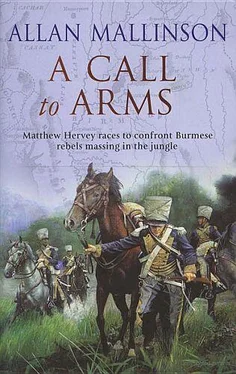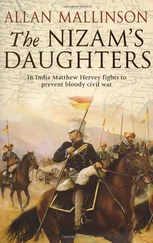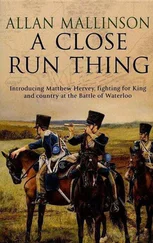The RSM turned right about, advanced ten paces and halted in front of the major, saluting sharply with his right hand. ‘Sir, there are two hundred and eighty-five men on parade, sir!’
The major made no reply. The RSM turned to his right, saluted, and marched towards the right marker and thence for the rear of the centre squadron.
‘Fall in the officers!’ The major’s words of command were more than an invitation, but feeble compared with those of the Stentor-RSM. When the officers had taken post, the major turned about in a little circling movement, unlike the RSM’s emphatic pivot, and advanced ten paces to where the general officer commanding the London District stood with the Sixth’s adjutant at his side. ‘My lord, there are twenty-two officers and two hundred and eighty-five other ranks on parade.’
‘Thank you, Eustace,’ said the general quietly. He walked towards the open side of the hollow square, the major falling in beside him, and halted a few paces before it. ‘By command of the Horse Guards, it is my duty to have read before the whole regiment, on parade, the following despatch from the commander-in-chief.’
Not a word was spoken, but there was a distinct buzz in the ranks. The adjutant took a pace forward, opened the red portfolio he was carrying under his scabbard arm and began to read. ‘His Royal Highness the Prince Regent has been pleased to confirm the findings of the court martial convened on September the fifth, eighteen hundred and eighteen, to try the evidence against Lieutenant-Colonel the Earl of Towcester of the unnecessary hazarding of his command in the Americas and for conduct unbecoming an officer, contrary to the Articles of War. The court finds that Lieutenant-Colonel the Earl of Towcester is guilty of the grossest negligence in exercising his command in the face of hostile irregulars, and of conduct on numerous occasions beforehand revolting to every proper and honourable feeling of a gentleman.’
The buzz returned. The RSM threw his head to left and right, and though not a man could have seen him, the noise stopped abruptly.
‘His Royal Highness directs that Lieutenant-Colonel the Earl of Towcester be dismissed from the service—’
The buzz returned louder than ever. The RSM maintained his eyes front, and the general waited patiently.
‘Be dismissed from the service … with disgrace .’
The buzz continued, until the RSM silenced it again.
‘The commander-in-chief directs that these findings be read out at the head of every regiment in the King’s service.’
This last brought so great a shock that the buzz did not recur for some moments, but louder still was the noise when it did come.
‘ As you were! ’ The RSM brought three hundred heads back to attention in an instant.
The general would now have his say, after waiting for the silence to have its effect. ‘This is an unhappy day for a regiment. It is an unhappy day for our country when an officer fails to do his duty.
It falls now to every man of the Sixth Light Dragoons to do his duty to the utmost, as indeed you have done it in the past, conscious that the rest of the service looks at you. Let it see not the unhappy example of an officer unfit for his position, but the regiment of Corunna, Salamanca, Albura and Orthès. And of Waterloo !’ He paused to a silent count of three. ‘God save the King!’
‘God save the King!’ came the reply, but none too full-throated. Major Joynson suddenly saw his duty. ‘Light Dragoons, God save the King!’ he roared, startling the RSM as much as anyone.
‘God save the King!’ bellowed the Sixth.
The general saluted and turned away. ‘Carry on, Major Joynson,’ he barked.
‘Sir! Adjutant, carry on!’
‘Sir! Regiment, to your duties, di-i-ismiss!’
At once the parade ground was a cacophony of words of command from the captains and serjeant-majors as each troop took itself off to stables, skill-at-arms or fatigues — whatever was the order of the day. A Troop more than the others could be forgiven if its collective thoughts were on what was past rather than on what lay ahead. Serjeant Collins perhaps spoke for them all as he fell in beside the troop serjeant-major. ‘There’s two men I should’ve liked to hear that.’
‘Ay. And it’s an empty place as well without Armstrong,’ replied the serjeant-major.
‘Fred, it’s going to take more than Mr Lincoln to get things as they were.’
‘Ay. An RSM can only do so much. I suppose Joynson’ll become colonel.’
Collins hesitated. ‘I suppose he will.’
CHAPTER TWO. PARADISE OF EXILES
The Caffè Greco, Rome, six months later
‘Who is the severe fellow there?’
The enquirer, a boyish-looking man of about twenty-five, stood at the bancone of the meeting place of Rome’s literati and artisti , drinking strong arabica.
‘I do not know,’ replied his companion. ‘Save that he is English. Or that he reads English, at least, for I saw him with an English newspaper yesterday.’
The younger man brushed a dark curl from his forehead and took another sip of his coffee. ‘But now he is reading Goethe, so by that reckoning he might equally be German.’
His companion gave a prolonged shrug.
‘I have observed him here several times this week,’ continued the younger man, draining his cup. ‘He has a decidedly melancholic air. He takes not the slightest interest in anyone around him. He seems wholly absorbed in himself. And that, my dear friend, is singular in this city, even for an Englishman.’
‘Then he would be dull company and not worth your regrets,’ declared his companion. ‘ Giuseppe ,’ he said to the cameriere on the other side of the bancone , nodding to the object of their curiosity. ‘ Il penseroso lá — chiè? ’ The Italian was without the accent of the country.
The cameriere shrugged his shoulders. ‘ Un’ufficiale inglese, dicono. Ma con me parla solo francese. ’
The younger man nodded. ‘Does he have any companions, Giuseppe? Ha amici? ’
The cameriere said something by reply, but fair though his Italian was, his questioner did not catch the sense.
‘He says that a young woman joined him yesterday,’ explained the other. ‘Handsome but not dressed with fashion.’
‘English too, then, certainly,’ said the younger man, raising his eyebrows.
‘But had she been German, she would likely as not have been neither fashionable nor handsome,’ replied the older one, smiling.
‘Oh, Rome is a harsh court in such matters! But in any event, an English officer reading Goethe has a sensibility I can respect.’
‘ Dicono che ha combattuto nella battaglia di Waterloo ,’ added the cameriere , helpfully.
The boyish-looking man’s ears pricked. ‘Now that is worth my regrets,’ he declared, glancing again at the seated reader. ‘He surely has a tale to tell. But I would not disturb his engagement with Goethe for all that. We shall see him at an assembly soon, no doubt. I am surprised, indeed, that we have not done so already.’
‘Perhaps both he and his lady companion are of an unsocial disposition.’
‘Perhaps.’ The younger man placed a few scudi on the counter. ‘ Grazie tante, Giuseppe ,’ he said, with an air of a man who had learned something of advantage.
‘ Grazie a lei, Signor Shelley ,’ replied the cameriere , as the two men turned to leave.
Matthew Hervey, for more than a year plain ‘mister’, and for more than a week an habitué of the Caffè Greco, still owned to mixed feelings at being in the city of the popes. One at least of his father’s profession — the rector of the neighbouring parish — had called the city ‘the whore of Babylon’ when Hervey and his sister had announced their intention to visit. And although there was nothing like so vehement a despising of Rome in his father’s parish, Hervey possessed the Englishman’s instincts. He did not care for the picture of black spectres pursuing temporal ambitions, especially usurping ones. His history he knew very well indeed. And yet there was no doubting that he liked the easy ways of this city. He had seen no especial excess of luxury or vice. Even in the pages of Goethe he saw little that might seriously offend an unprejudiced conscience. What he did see in Rome was gaiety in large measure, and he was most glad of it. And his sister, too, always a sure weathercock of propriety, seemed as glad as he. That he was still, himself, restrained from joining with that gaiety did not diminish his appreciation of it.
Читать дальше










